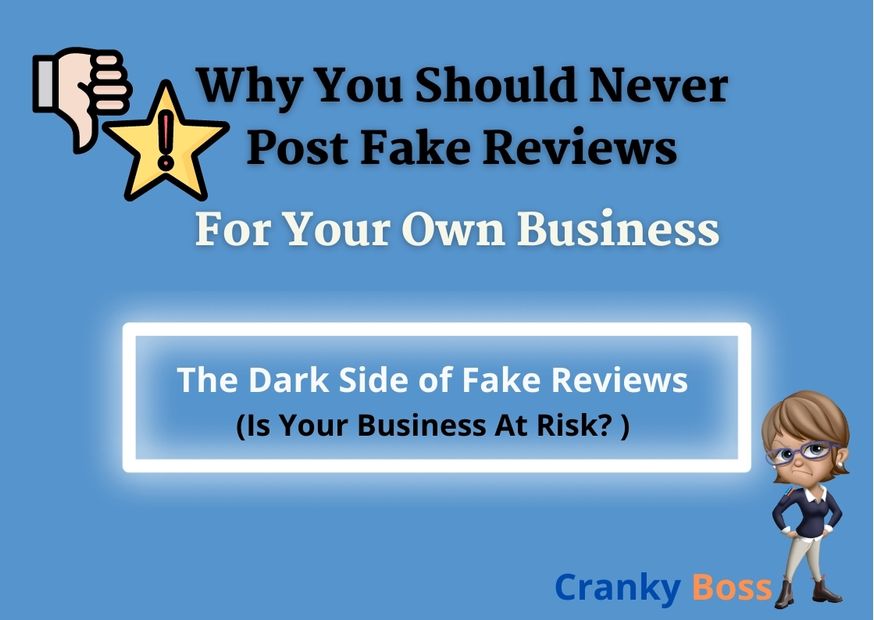Have you ever heard of people writing fake reviews to make their business seem better than it really is? Well, let me tell you, it’s not a good idea, and I’ll explain why. In this post, we’ll explore why posting fake reviews is dishonest, how it can harm your business in the long run, and the importance of building trust with your customers.
Why Do Businesses Post Fake Reviews?
Businesses may post fake reviews to trick consumers into thinking their products or services are amazing. Why? Well, it’s all about making more money and gaining an unfair advantage.
When a business gets lots of positive reviews, it can attract more customers. People trust reviews because they think they’re from real customers. Positive reviews can make a business look popular and reliable. This can lead to more sales and profits. Sadly, some businesses want these benefits so badly that they’re willing to cheat by posting fake reviews. Don’t do it.
It’s dishonest and unethical.
First and foremost, posting fake reviews is simply not the right thing to do. Honesty is a crucial value, and when we post fake reviews, we’re being dishonest with our customers. We should always strive to be truthful and transparent in our business practices. If we pretend to be something we’re not, it can damage our reputation and make people lose trust in us.
It can harm your business.
Now, let’s talk about how posting fake reviews can negatively impact your business in the long run. When customers rely on reviews to make purchasing decisions, they expect honesty. If they find out that your business has been posting fake reviews, they will feel deceived and betrayed. This can lead to a loss of customers and a damaged reputation.
Moreover, many online platforms have strict policies against fake reviews. If they catch you posting fake reviews, they may remove them and even suspend or close your business account. This not only affects your online presence but can also result in financial losses.
Additionally, posting fake reviews can lead to legal trouble. In some places, it’s illegal to create false testimonials or deceive consumers. Violating these laws can result in fines or even lawsuits, which can be very costly and time-consuming.
In a recent case the federal court of Australia ordered SPG company to pay $125,000 for posting fake reviews under invented names on various platforms. They went as far as creating false invoices to back up their testimonials! Wow!
Similarly in the USA the Federal Trade Commission has announced a proposed rule banning fake reviews and testimonials.
Building trust with customers is vital.
Trust is the foundation of any successful business. When customers trust your business, they are more likely to choose your products or services. Posting fake reviews breaks that trust. Instead, focus on building an honest reputation by delivering high-quality products, providing excellent customer service, and encouraging genuine feedback from your customers.
When you receive authentic positive reviews, they carry much more weight and credibility. Real customers sharing their positive experiences can attract new customers and build a loyal customer base. Remember, it’s better to have a few honest positive reviews than many fake ones.
Consumers Can Spot Fake Reviews
Thankfully, there are ways to spot those sneaky fake reviews. So think twice before you even consider it.
- Extreme Opinions: Fake reviews often exaggerate or use over-the-top language. If your review sounds too good or too bad to be true, it might be fake.
- Similar Wording: Several reviews that sound almost the same, could be a sign of fake reviews. Real customers have different opinions and express themselves uniquely.
- Generic Names: Fake reviews may be written by people with generic names like “John” or “Jane Doe.” Real customers often use their unique names or nicknames.
- Review Dates: If a product suddenly gets hundreds of positive reviews in a short time, it’s suspicious. Real reviews usually appear gradually over time.
Why Supporting Honest Businesses Matters
Supporting honest businesses is crucial for several reasons. When we choose to buy from honest businesses, we encourage fair competition. Honest businesses work hard to provide excellent products and services, and they deserve our support.
Moreover, fake reviews can mislead consumers into making poor purchasing decisions. Imagine a customer buying something based on glowing fake reviews, only to realize it’s not as great as you claimed. By supporting honest businesses, consumers can make informed choices and avoid wasting their hard-earned money.
Additionally, honest businesses should contribute positively to our communities. We provide jobs and contribute to the local economy. In return, when consumers support us, we help create a better environment for everyone.
Conclusion
In conclusion, posting fake reviews for your own business is a bad idea for several reasons. It’s dishonest and unethical, can harm your business in the long run, and damages the trust you’ve built with your customers.
Fake reviews might seem tempting to your business, but they’re like a house of cards waiting to collapse.
Instead, focus on providing excellent products and services, and encourage genuine feedback from your customers. Remember, building trust takes time, but it’s worth it in the end. If you have an exit strategy in place and wish to sell your business at some point in time, you will need your good will to be squeaky clean. So, choose honesty and integrity in your business practices.
And whilst we are on the topic of the do’s and dont’s of reviews – Don’t post bad reviews on your competitors business either!

